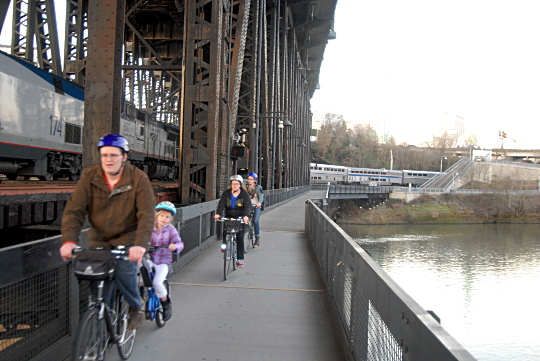
(Photos by M.Andersen and J.Maus/BikePortland)
Tourism to Portland is soaring. But who is coming here, and why?
County tax records offer a clue to part of the picture: Even as Portland has become a more popular destination for travelers, the records show, spending at local auto rental services has dropped.
Aggregate revenue at Multnomah County’s hotels and motels is up 26 percent since 2001, after adjusting for inflation. Real car rental revenue, meanwhile, has fallen 13 percent.
Some of the change is likely due to Portland’s rising status as a regional destination: visitors from Missoula or Seattle are likely to simply drive their own cars to town. But the size of the shift also suggests that Portland’s tourism boom is being driven in part by people who don’t expect to use a car at all while they’re here, said Megan Conway, vice president for communications at Travel Portland, the city’s hotel-funded tourism bureau.
“You can come and get around on the MAX, or your hotel might have a free bike that you can use,” Conway said. “That’s definitely appealing to the people who come here.”
Travel Portland’s “Portland is Happening Now” campaign recently placed collage-style ads in Seattle newspapers that featured three bicycles, a trike, a bus, an Amtrak engine, a streetcar, a light rail car, an airplane, a skateboard and a unicycle, but no automobiles.
Sitting in the lobby of the Ace Hotel with a friend last month, Paul Day said he’d decided against renting a car for his visit.
“I got in today from San Francisco and I took the light rail; I went to Pok Pok and I took the bus back,” he said. “It’s been 10 years since I’ve been here, and I remembered how easy it was to get around.”
The previously unreported numbers are calculated from Multnomah County hotel-motel and car rental tax income and rates, provided by county spokesman Mike Pullen. Changing costs in the auto and hotel market might also play a part — but nationally, real auto rental revenue is unchanged since 2001 while the lodging industry has grown only 13 percent.
“Active vacationing is something that I didn’t really experience as a kid. It’s not just riding around in a car going from restaurant to restaurant.”
— Scott Klees, Pedal Bike Tours
In other words, the whole country is downshifting its car rental spending per lodging dollar. But in the Portland area, this seems to be happening at least twice as fast.
In Multnomah County, the split between lodging and auto rental demand seems to have begun in 2003 — two years after the Red Line connected to the Portland Airport, two years after Bicycling Magazine first named it the country’s best bike city, three years after Amtrak Cascades added a fourth daily train between Seattle and Portland and seven years before the debut of Portlandia on IFC.
“People are realizing, ‘I want to raise my kids with an active lifestyle,’ so people will take a Portland-style vacation: hiking, biking,” said Evan Ross, owner of Cycle Portland in Old Town.
Ross said he’d launched the city’s first bike tour and rental service after returning from a 2007 trip to Europe and getting a hunch that the same thing could work in Portland.
“I got back and I was like, why is nobody doing this?” Ross said.
A few blocks away at Pedal Bike Tours, manager Scott Klees told a similar story.
“There are a lot of people who are here just to do things by bike,” Klees said. “Active vacationing is something that I didn’t really experience as a kid. It’s not just riding around in a car going from restaurant to restaurant.”
One of Ross’s customers, Nisarg Shah, said he was relying in part on hitching car rides with a friend while visiting from California, but that he and his friends were deliberately using public transportation and biking while in Portland.
“When you go to Wikipedia, the first thing you see is that the public transit is very good,” said Shah, 27. “We wanted to explore Portland either by Segway or by bicycle. You can stop anywhere that you want. In a car you can’t.”
Is this trend related to the much-discussed economic impact of bike tourism on the region? Probably not a lot of it. Even the estimated $400 million impact of bike-related tourism is just 4 percent of total Oregon tourist spending, and many of the dollars measured by the Travel Oregon study are actually Portlanders and other Oregonians traveling more than 50 miles from home for bike-related daytrips or overnights — a valuable decision for their destination, but not likely to involve a car rental in any case.
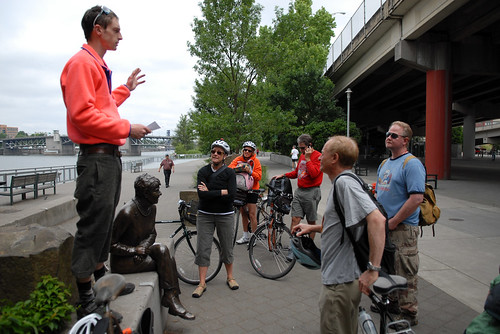
Instead, the shift is more likely due to the collective decisions of hundreds of thousands of visitors like Day and Shah — people who for many reasons found Portland an attractive destination, but didn’t see the need to rent a car during their visit.
Conway, the Travel Portland executive, said Portland’s identity as a low-car city is part of the national brand that seems to be bringing it such success, along with its reputations for food, drink and fashion design.
“It’s something that we hear people refer to, that the city has a very European feel,” she said.
Whatever Portland has been up to, it seems to be working, at least where tourism is concerned.
“We are on trend if not above trend for what the country is seeing,” Conway said. “That kind of growth is amazing from an economic impact standpoint.”



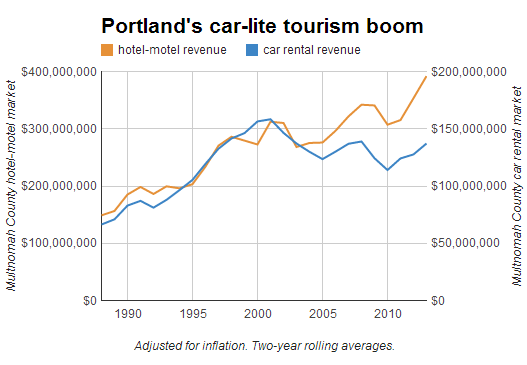
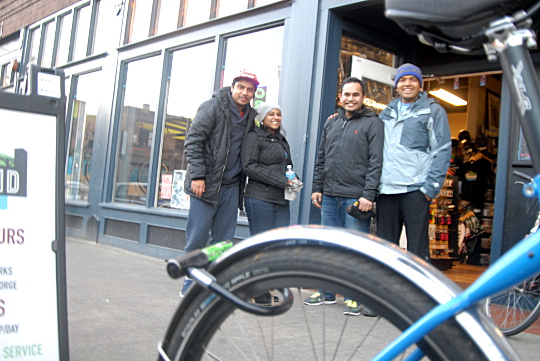
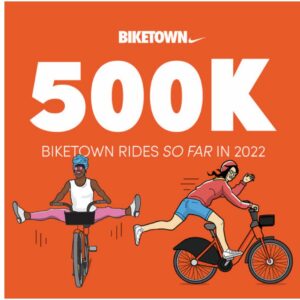

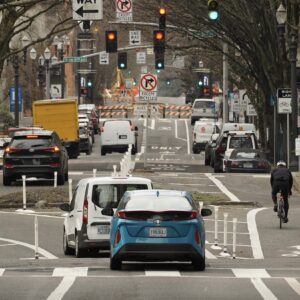
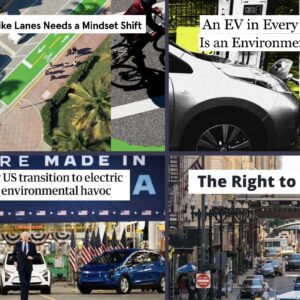
Thanks for reading.
BikePortland has served this community with independent community journalism since 2005. We rely on subscriptions from readers like you to survive. Your financial support is vital in keeping this valuable resource alive and well.
Please subscribe today to strengthen and expand our work.
Is there any tracking of bicycle rentals similar to the tracking of car rentals?
I’m not sure. The only reason we were able to get the hotel and car rental numbers is that they’ve got their own tax categories. The city might have its own category for these businesses in its business tax, but I sort of doubt it.
I’m sure all of us bike rental folks track our own rentals.
‘I want to raise my kids with an active lifestyle,’ so people will take a Portland-style vacation: hiking, biking,” said Evan Ross, owner of Cycle Portland in Old Town.
That’s a long day of biking to hiking, unless you hike in Forest Park.
Or Marquam Nature Park. Or Tryon Creek State Park. Or Riverview Natural Area. Or Powell Butte. Or Oaks Bottom Wildlife Wildlife Refuge.
I visit from Seattle about once a year and I think the last time I rented a car in the Portland area was 5 years ago, for a day trip out of Portland. After which, we returned the car and continued our Portland visit carless. I love going to Portland and not having to think about parking or drive time. Just catch the next bus/train and good to go. And can imbibe delicious beer without worry as well (unless on a bike of course). And as a Seattle-ite it makes me jealous and frustrated with the comparatively rudimentary transit options here…
Imbibe all the beer you want, until the buses and trains drop to near-useless frequencies (or more likely, stop running) at the late, late hour of 12 or 1am. Then, you’re stuck with a long wait for an expensive cab unless you happen to be in one of the few chosen areas where taxis circle around. As you probably are aware, there is no ridesharing to be had here.
Never had a problem with that when I visit. Just keep an eye on the time. And cabs in Portland are not expensive comparitively! If it came to a cab, I’d pay it if necessary…it’s carpooling!
Right, but if you’re not paying for car rental then the expense of an occasional cab it not difficult to bear, and it’s not that difficult to plan around that sort of thing.
I opt for most of my vacations in Portland and Seattle not only because I have lots of friends in both cities, but also because both are relatively easy to get around in without a car (I don’t drive at all) and are so bike-friendly. If my hometown was more bike-friendly, I’d visit more often. If other cities near NYC were more bike-friendly, I’d do more short trips to those.
I sense that the increase in hotel/hostel usage could also be due to lack of rental housing and people using those as temporary housing until they find a place to live…
but I’m sure a lot of it has to do with our awesome transit options…
I wonder if this analysis also included car-sharing taxes collected in 2003 and currently…since this service is included in rental car taxes up here in WA. And these services are now more likely to be used by visitors to Portland, those who already have an account in their home city. (We do this all the time in when training or biking up to Seattle, etc.)
Also…think of where much of the high profile (advertised) hotel investment has been in the last ten years…it has been in the CBD and Central Eastside…places that do not make it easy to bring a rental car on site (parking charges or no room) while making it easy to walk/bike/ transit…
…and then there is the Red Line MAX which only opened the week of 9-11 and took out of town tourists time to find and use in high numbers.
Portland is one of very few cities that doesn’t tax carsharing like rental cars, so no, Zipcar is not included. I’d argue that Zipcar etc, as opposed to car rental, are actually signs of less car-dependent tourism, since they’re ideal for Multnomah Falls daytrips but not for using a car all week for everything.
I’m sure the Red Line is a very big factor, and I assume that hotels have been locating downtownish because that’s where the new demand is.
Yet another factor here is the auto rental tax rate, which increased from 12.5% to 17% in 2009.
If someone is smart, they’ll get a bike rental business started up or expanded near the Convention Center. Once the hotel is built, I predict the demand for rental bikes will soar.
I happened to talk with a tourist at a restaurant last night, she was here to put on a screening at the Hollywood Theater tonight. Staying at a BnB for 2 nights, going around on foot and transit, and wishing she had a bicycle.
I like this trend.
To me, there are just a handful of U.S. cities where it’s more fun/convenient to NOT rent a car than to rent one (and these are usually the cities that are most fun to visit). It’s nice to think that, for people who aren’t from here, Portland’s on that list.
Good photo including curving Amtrak and happy bicycling family on the bridge.
I’m not sure this means what most of us want it to mean. It could simply mean that car rental prices haven’t gone up at the same rate as hotel/motel prices. There could be growth in the number of car rentals but if prices haven’t gone up the same that hotel/motel prices, you wouldn’t see it on a graph of the total dollar value of the market. Since hotels and cars are different things (and are not substitutes for each other), it makes perfect sense for their costs to rise and fall independently.
I’d rather see graphs of the number of rooms rented and the number of car rentals, and see what those look like. Then we can draw conclusions.
I am not an economist, but I do help manage a $70 million/yr budget.
Good points. I had similar thoughts – but if so, why would this be true in Portland and not nationally … and why would the two trends have moved in such lock step until 2003?
Michael, I don’t think you’re looking at the two series correctly. They seem to run “in lock step” up until 2000 because of the way you set up the two scales on the left and right.
But if you just look at the movements (up, down, flat), it looks to me like the still DO run in lockstep except that the car rental time series trended downwards from 2001-2004. Before and after, the trends are nearly mirroring one another.
This MAY support what you argue–that visitors here are renting cars at a lower rate per visit from 2004-2013 then they were from 1990-2000, but you’d also need to know why there was that linear decline from 2001-4.
But it looks an awful lot like some sort of intervention that drove the series down to a lower level where it then stabilized and is now tracking the hotel series again.
Right, but this is why I made sure the two scales both start at 0 and that one is exactly 50% of the other. The point is that the ratio between lodging dollars and auto rental dollars was almost exactly 2:1 until 2003, and now it’s more like 3:2. That’s the meaningful change.
We visited town a couple of times before we decided to move here. One of the main benefits which convinced us to make the move is we didn’t need a car for either trip at all. We took Max, rented bikes, walked a lot. That sold us. (Seattle lost out in a large part due to its car dependence that I’ve experienced there.)
Thanks for this article. There is little to no research about how the drop in VMT affects tourism and our destination choices. Esp. with regards to Millennials. Most Millennial tourism studies focus on technology (put wifi in your hotel!) and that they like experiential tourism (who doesn’t though?). I think that perhaps as people drive less at home, they will probably choose destinations that don’t require you to drive to get around. Thus creating livable/bikeable communities functions to serve both to improve quality of life for residents, but also act as a tourism asset!
We haul our guests to most destinations in a Zipcar. If you never leave Portland’s food, drink, and shopping, that’s fine, but I wouldn’t let anyone visit from out of town without showing them Oregon’s natural beauty at the coast or in the Gorge—not biking distance for most. If it’s a secret, we need to hide those Pacific Wonderland plates!
Likewise, we do that for ourselves in other cities where it’s available. Maybe that’s what other people are doing too.
Why travel to an alternative transportation Mecca as PDX is and rent a car? The trend line for auto rentals is heading in the right direction I’ve traveled to PDX regularly from Spokane for years and have never rented a car. The red eye Empire Builder I take doves tails nicely into your transportation mix. And with excellent metro transportation options, first bikes on buses for TRI MET and finally access for my wheeled steed directly onto an ever expanding MAX system, there are a lot of options that keep me coming back and revisiting Portland.
2009 photo: ah, that was during my 90’s neon phase. Love it!
I am suprised that we don’t have bike rental at PDX yet!
I followed the link about car rental revenue being down…. and found a chart showing it up nationally $8 billion (2003 – 2013). Is there another chart specific to Portland?
The numbers on that page show that from 2001 to 2013, auto rental has increased nationally from $18.2 billion to $24.4 billion. After inflation (32% since 2001) that comes to a 2% increase. In Portland, by contrast, the auto rental market is down 13% after inflation. This is shown in the chart above, which comes from Multnomah County figures.
The inflation-adjusted increase in the national auto rental market since 2003 is slightly steeper, because 2003 was a recession year. I used 2001 here because it was neither boom or bust and because that was the first year for which I could also find national data for both auto rentals and lodging.
Could it be that some people are simply vacationing here using their own vehicles or that Zipp cars, taxis, and MAX from the airport has made it easier to access the downtown core? I really doubt the majority of visitors are renting or using bicycles…at least not between October and June.
I agree, Jeff – transit and central city development are probably much bigger factors. But it’s certainly all related.
We came down with our kids last summer. Bolt Bus down, Amtrak back, an public transit while in Portland. It was great. The all day transit pass lets you move around the city freely. We’ll be back.
When I visit Portland, I take the train and just ZipCar everywhere. So, I’m still renting a car, but I don’t count in these stats. I’m guessing a lot of other people who visit from Seattle do the same thing and rent ZipCar or Car2Go. I’d like to say I visit and bike or bus everywhere, but no — I’m still driving.